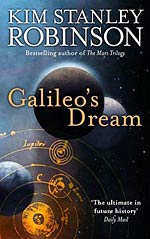
![]() Birgitte SB
Birgitte SB
6/5/2010
![]()
Galileo was science's greatest martyr. And a time traveler based off the celestial bodies Galileo discovered means to make sure history stays that way. But why exactly does science need a martyr?
I can't help but respect the research that went into this book. The numerous excerpts of historical writings and the depth and breadth of the worldbuilding done for 17th century Italy had me constantly tempted to run to Wikipedia to verify where the fiction began. But the careful work that makes Italy seem so richly dimensional leaves the 24th century seeming blatantly insubstantial by comparison.
Unfortunately the exposition never seemed to end. The narrative is submerged even as late as Galileo's heresy trial to explain the intricacies of Vatican politics at that point in the Thirty Years War. The narrative, which was weak to begin with, is drowned amid all these explanations. The fact the end of the book contains a bit where narrator reveiws how he gained the information necessary to tell the story, is confirmation that the narrative was never able to stand on its own.
The characters, with few exceptions, are flimsy. We are given little understanding of them outside of their immediate relationship with Galileo. Galileo stands out as fully formed and faceted, but unfortunately Robinson seems unwilling to let him keep his warts without trying to smooth them over in the time-traveling bit.
The most redeeming bits of the book for me were the wonderful insights and thought provoking questions sprinkled throughout. There are also many gems of truly skilled writing where she beautifully portrays some of those little life experiences that are usually so hard to describe. Overall this made the sidetracked expostions and the time-traveling plot lines that never quite make sense worth slogging through.